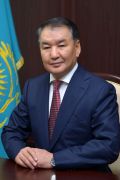Constitutional Reform in Kazakhstan: First Results
By Kairat Mami
Published on June 11, 2018

The 2017 constitutional reforms in Kazakhstan signify a new step forward in the ongoing development of Kazakhstan’s society. These reforms, first announced by President Nazarbayev, have laid the necessary political and legal frameworks to help Kazakhstan become one of the top thirty most developed countries of the world. This is a major aim of the Kazakhstan 2050 Strategy.
High rates of global development, the ongoing modernization of the civil service and the challenges of the past decade have combined to bring about constitutional changes in many countries around the world.
Kazakhstan is no exception. We are committed to ensuring the constitution continues to serve the needs of our citizens and supports the development of society in general. Conscious of these modern challenges, Kazakhstan has taken proactive measures to increase the efficiency of our public administration and institute democratic reforms in our political system.
Our country’s international partners have congratulated us on these constitutional reforms. The European Commission for Democracy, also known as the Venice Commission, an advisory body of the Council of Europe, noted that the constitutional transformations in Kazakhstan have demonstrated real progress and have laid the foundations for the country’s future development.
As part of these reforms, a substantial proportion of the presidential powers were passed to Parliament and the Government. This has helped improve the efficiency and responsibility of public administration and will have a lasting benefit on the country’s productivity.
Under these reforms, the role of the President will take on a more strategic function. The President will act as a convener and arbiter, maintaining positive relations between the different branches of government. It will also be responsible for key national areas of importance, including foreign policy, national security and defence.
These constitutional changes have brought about a greater divestment of governmental powers. This in turn has led to a stronger parliamentary and legislative process at both national and regional levels. It has also helped to expand parliamentary oversight of the executive branch.
The Astana International Financial Centre, which was launched earlier this year, is now a preeminent financial hub in Eurasia. Its creation has also been made possible through the introduction of these constitutional reforms.
Elsewhere, changes to the courts and justice section of the constitution, have introduced the potential for further judicial reforms. A new law on the Prosecutor’s Office has been adopted. It optimizes the forms, scope and authority limits of the Prosecutor’s Office, and enhances its functionality when representing the State in court, and its criminal prosecution functions in order to maintain the efficiency of prosecutorial supervision and its human rights component.
The mechanisms for protecting the foundations of the constitutional system have been substantially strengthened. The independence of the state has been included in the charter of unwavering constitutional values that cannot be amended, even through a revision of the Constitution. The Constitutional Council will now offer its legal assessment of the proposed changes, ensuring they are in line with national law. The constitutional revisions will then be brought to a national referendum or to Parliament for final approval.
One of the most pressing threats facing 21st century societies is that of global terrorism. Revisions to Kazakhstan’s laws now make it possible to revoke citizenship from individuals who have committed terrorist acts and who have caused grave harm to vital national interests. Such measures are implemented by the courts and follow similar protocols currently in place in France, the USA, the UK, Bulgaria and other countries.
Elsewhere, amendments to Article 39 of the Constitution enhance the guarantees of peaceful coexistence amongst the various ethnic and religious groups in Kazakhstan. Kazakhstan’s model of public harmony has long been recognized by the international community and is often cited as an example of successful ethnonational integration.
The successful implementation of these reforms can only be made possible if they are approved by wider society. In this regard, the President’s decision to launch the Ruhani Zhangyru (modernization of national identity) program was timely. Its main aim is to promote the modernization of the country’s national identity. This will help advance a modern, outward looking vision amongst the citizens of Kazakhstan.
The development of a modern national identity also includes the promotion of greater legal awareness. To this end, the government has launched large-scale projects aimed at increasing citizen’s legal awareness and their understanding of their legal rights and obligations.
Undoubtedly, the revised Constitution has been a key driver in the development of modern Kazakhstan. These new laws, processes and legal frameworks will continue to act as an effective structure to support Kazakhstan’s future development. These robust reforms will ensure that Kazakhstan will remain on its path to becoming a modern, dynamic and prosperous country.
The Author

The author is Chairman of the Constitutional Council of the Republic of Kazakhstan.
Article picture: A Kazakhstan performer demonstrate the long equestrian heritage as part of the gala concert during the opening ceremonies of Central Asian Pescekeeping Battalion (CENTRASBAT) 2000, Almaty, Kazakhstan, Wednesday 13 September 2000. SSGT Jeremy T. Lock. Source: Wikipedia.


